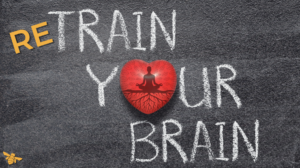Rewiring the Mind, Heart, and Spirit: The Neuroscience of Inner Peace
In our hyper-connected, always-on lives, stress isn’t a passing state—it’s become a chronic condition. For high-achieving professionals, business owners, and caregivers alike, the grind of daily responsibilities can leave the nervous system frayed, the mind foggy, and the spirit drained.
But there’s good news: emerging neuroscience shows that meditation is more than a spiritual practice—it’s a scientifically backed method for rewiring your brain, calming your body, and reconnecting you with your deeper self. And it only takes a few minutes a day to begin.
Keep reading to discover how meditation rewires the brain…
The Science of Mind
Meditation doesn’t just make you feel better—it literally changes your brain.
Here’s how.
-
Strengthening the Prefrontal Cortex: Your Command Center
The prefrontal cortex is responsible for executive functioning—attention, decision-making, and self-awareness. Studies using MRI scans reveal that regular meditation increases gray matter density in this area, enhancing your capacity to focus, plan, and respond rather than react (Lazar et al., 2005).
For busy professionals, this translates into sharper thinking, more intentional leadership, and fewer impulsive decisions made from a place of stress.
-
Shrinking the Amygdala: The Fear Center
The amygdala, your brain’s alarm bell, is activated during stress, triggering fight-or-flight responses. Chronic stress keeps it overactive, causing irritability, anxiety, and burnout.
But research shows that regular meditation can reduce the size and activity of the amygdala—especially when paired with breath-focused mindfulness (Taren et al., 2015). You become less emotionally reactive and more grounded, even during high-pressure situations.
-
Boosting the Hippocampus: Memory and Emotional Balance
The hippocampus plays a vital role in memory and emotional regulation. Meditation stimulates neurogenesis (the birth of new neurons) in this region, supporting learning, resilience, and emotional clarity (Hölzel et al., 2011). In essence, meditation rewires you for long-term adaptability and grace under fire.
-
Regulating the Default Mode Network (DMN): The “Monkey Mind”
The DMN is active during self-referential thinking—those times when your mind spirals with worry, regret, or mental to-do lists. While it’s useful for reflection, an overactive DMN is linked to anxiety, depression, and obsessive thinking.
Mindfulness meditation reduces activity in the DMN, helping you quiet the inner critic and return to the present moment (Brewer et al., 2011). The result? Less mind-wandering, more peace.
From Stress to Serenity: Calming the Nervous System
Beyond the brain, meditation affects the entire nervous system, shifting you from chronic stress mode to a state of balance and restoration.
Activating the Parasympathetic Nervous System
When you meditate—especially with breathwork—your body exits fight-or-flight mode (sympathetic activation) and enters rest-and-digest mode (parasympathetic activation). This shift lowers blood pressure, slows heart rate, and sends the message: “You’re safe now.”
According to research from the Harvard Medical School, even brief mindfulness practice can down-regulate stress hormones like cortisol and support long-term physiological calm (Bhasin et al., 2013).
Toning the Vagus Nerve for Resilience
The vagus nerve is a communication superhighway between your brain, heart, and gut. Higher vagal tone is linked to better emotional regulation, resilience, and heart rate variability (HRV)—a key marker of health.
Meditation, especially practices involving loving-kindness and deep breathing, improves vagal tone, helping you bounce back more quickly from stress (Kok et al., 2013).
Balancing Cortisol: The Stress Hormone
When stress becomes chronic, cortisol stays elevated—impacting sleep, weight, immunity, and mood. Regular meditation has been shown to lower baseline cortisol levels, reducing overall tension and safeguarding long-term wellness (Pascoe et al., 2017).
A Whole-Self Reset: Brain, Body, and Beyond
Let’s zoom out for a holistic picture. Meditation affects more than just mental clarity—it influences how we show up in the world.
| Area | Impact |
| 🧠 Cognitive | Sharper focus, clearer thinking, better memory |
| 💖 Emotional | Less anxiety, greater patience, emotional resilience |
| 🧘 Physical | Lower blood pressure, improved sleep, reduced pain |
| 🔁 Behavioral | Better habits, more mindful reactions, improved communication |
| 🌱 Spiritual | Greater sense of meaning, self-compassion, and connection with others |
Why This Matters More Than Ever
Today’s professionals are facing more than tight deadlines and inbox overwhelm. We’re contending with a global epidemic of burnout, disconnection, and chronic anxiety. And many suffer silently, feeling they must keep pushing through.
Meditation offers an antidote. Not by asking us to do more—but by guiding us to be more present.
In the words of Zen master Thich Nhat Hanh:
“Feelings come and go like clouds in a windy sky. Conscious breathing is my anchor.”
Meditation is that anchor. It rewires the nervous system, reshapes the brain, and reawakens the heart. It reminds us that we are not our stress. We are not our to-do lists. We are spacious, wise, and grounded—when we remember to come home to ourselves.
Start with Just One Minute
You don’t need to meditate for an hour on a mountaintop to feel the benefits. Even one mindful breath begins the reset and rewire your brain for greater peace of mind.
That’s why I created Mindful Minute Mondays—a weekly, 30-minute virtual gathering for professionals who are ready to reclaim their calm, clarity, and confidence. Each week, we explore a new meditation theme to help quiet the mind, soothe the body, and strengthen the heart.
If you’re feeling overwhelmed, scattered, or just plain tired of running on empty—join us.
🌀 Mindful Minute Mondays
⏰ Every Monday at 12pm PT / 3pm ET
🌐 Join us here
Let this be your moment to pause, breathe, and begin again.
Michele Molitor, CPCC, CCHT, is a certified coach, clinical hypnotherapist, and co-author of the bestselling& award-winning book, I Am Perfectly Flawsome – How Embracing Imperfection Makes Us Better. She coaches high-achieving professionals in reducing their overwhelm and reclaiming their self-confidence, calm, and clarity to create a thriving life and career.
Connect with her directly to unlock your potential and step into your power with confidence.
Someday Starts Now. Unlock the Power of You.
📚 References
Bhasin, M. K., Dusek, J. A., Chang, B. H., Joseph, M. G., Denninger, J. W., Fricchione, G. L., … & Libermann, T. A. (2013). Relaxation response induces temporal transcriptome changes in energy metabolism, insulin secretion and inflammatory pathways. PloS one, 8(5), e62817. https://doi.org/10.1371/journal.pone.0062817
Brewer, J. A., Worhunsky, P. D., Gray, J. R., Tang, Y. Y., Weber, J., & Kober, H. (2011). Meditation experience is associated with increased cortical thickness. Neuroreport, 22(17), 1142.
Hölzel, B. K., Carmody, J., Vangel, M., Congleton, C., Yerramsetti, S. M., Gard, T., & Lazar, S. W. (2011). Mindfulness practice leads to increases in regional brain gray matter density. Psychiatry Research: Neuroimaging, 191(1), 36–43. https://pmc.ncbi.nlm.nih.gov/articles/PMC3004979/
Kok, B. E., Waugh, C. E., & Fredrickson, B. L. (2013). Meditation and vagal tone: A review of findings and physiological mechanisms. Psychological Science, 24(7), 1120–1127.
Lazar, S. W., Kerr, C. E., Wasserman, R. H., Gray, J. R., Greve, D. N., Treadway, M. T., … & Fischl, B. (2005). Meditation experience is associated with increased cortical thickness. Neuroreport, 16(17), 1893. https://pmc.ncbi.nlm.nih.gov/articles/PMC1361002/
Pascoe, M. C., Thompson, D. R., Jenkins, Z. M., & Ski, C. F. (2017). Mindfulness mediates the physiological markers of stress: Systematic review and meta-analysis. Journal of Psychiatric Research, 95, 156–178. https://pubmed.ncbi.nlm.nih.gov/28863392/
Taren, A. A., Creswell, J. D., & Gianaros, P. J. (2015). Dispositional mindfulness co-varies with smaller amygdala and caudate volumes in community adults. PLoS One, 10(5), e0126447. https://pubmed.ncbi.nlm.nih.gov/23717632/



